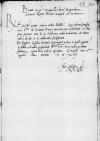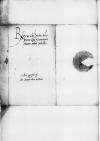Letter #3073
Bona Sforza to Ioannes DANTISCUSCracow (Kraków), 1547-04-05
| received Heilsberg (Lidzbark Warmiński), 1547-04-30 Manuscript sources:
| ||||
Text & apparatus & commentary Plain text Text & commentary Text & apparatus
Reverendo in Christo Patri, domino
Reverende in Christo Pater, sincere nobis dilecte.
Quae ad nos scripsit Vestra Paternitas de
De Anglicis, Gallicis, Danicis, Germanicis rebus si quid cognitum habebit, id nobis perscribat Paternitas Vestra, rem nobis gratam factura.
Quam bene valere optamus.
Ex commissione propria s(acrae) or s(erenissimae)⌈s(acrae)s(acrae) or s(erenissimae)⌉ regalis maiestatis


 BCz, 3465, p. 336
BCz, 3465, p. 336